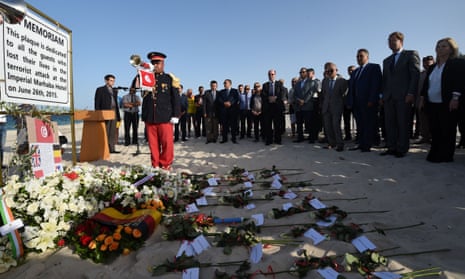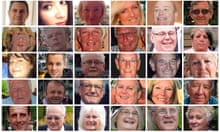A phased lifting of Foreign Office advice not to to travel to Tunisia is expected to be proposed, a move that would delight a tourist sector almost wiped out by last year’s terror attack which claimed the lives of 30 British holidaymakers.
The lifting of the advice, which was imposed after the killing last June of 38 tourists on a beach near Sousse and warns against all but essential travel to every part of Tunisia, is unlikely to be proposed until after the end of Ramadan.
It would have to be agreed across Whitehall, and would probably be lifted in phases, with certain areas still subject to the warning until the whole country is deemed to be safe.
The impact of the Sousse attack and the ensuing travel warnings have had a devastating effect on the Tunisian economy, leaving some hotels with as 5% occupancy.
Tourism normally accounts for 8% of the country’s GDP. Revenues for the first quarter of this year were down by 51.7% on same period in 2105, according to the central bank. The number British tourists travelling to Tunisia, previously the bulk of its summer visitors, fell by 90% after the attack.
The UK security team has been discussing a 48-point checklist of changes that need to be made by Tunisia to improve security.
One outstanding issue is whether the hotels should be required to hire armed guards from private security agencies to patrol their buildings and grounds. Tunisian law only allows state agents, such as police, to carry weapons, and any relaxation of that rule would require legislative change.
The country’s tourism minister, Selma Elloumi Rekik, said she had received assurances of a shift in Britain’s position after she held private meetings with Tobias Ellwood, a junior minister at the UK Foreign Office, last week.
Ellwood travelled to Tunisia to take part in the anniversary memorial for the tourists who were gunned down at Port el Kantaoui, near Sousse. Seiffeddine Rezgui, the gunman, was shot dead by Tunisian police in an alley.
The Tunisian ambassador to the UK, Nabil Ammar, who comes from Sousse, has made a public plea for a change in the British stance, saying that a gap now existed between the “perception of the level of security, and the real security in the country”.
He said: “Every week terrorist cells are dismantled. Terrorists are arrested or neutralised. This should give a positive image, not a negative one.
“If you take statistics, you have much less chance to die in Tunisia or to have any harm in Tunisia than so many countries close to us.”
The British security demands have ranged across improved intelligence, border controls, security at airports and hotels. Conspicuous police patrols now operate on beaches and in hotels.
As part of the upgrade in security, a small team of British trainers was initially deployed to Tunisia in March 2016 and has been providing training with a multinational team at the Explosive Ordnance Device school in Tunisia.
The team will be now working with the commando unit of the Tunisian National Guard, a project undertaken at Tunisia’s request. The training over the summer will “focus on medical training, small boat handling and security operations training”.









